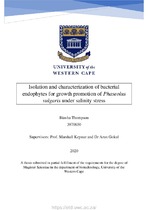Isolation and characterization of bacterial endophytes for growth promotion of Phaseolus vulgaris under salinity stress
Abstract
As the global human population grows, so does the demand for faster food production rates. Owing to this, agricultural practices have had to expand and move into semi-arid and arid regions, too, where frequent irrigation is essential. However, irrigated ground water contains many salt ions (mainly Na+ and Cl-) which contribute to soil salinization on croplands. Soil salinity negatively impacts crop growth and yield and thus, strategies for the alleviation of salt stress on crop plants have had to be developed. This study assessed the use of plant growth promoting bacteria (PGPB). The aim of this study was to isolate, identify and characterize bacterial endophytes isolated from the halophyte, Arctotheca calendula. Endophytes were identified using 16S rDNA and were screened for plant growth promoting properties including nitrogen fixation, phosphate and zinc solubilization, siderophore, ammonia and indole-3-acetic acid (IAA) when exposed to 0 mM, 300 mM and 600 mM NaCl. The endophytes had been identified as Erwinia persicina NBRC 102418T, Bacillus marisflavi JCM 11544T, Ochrobactrum rhizosphaerae PR17T, Microbacterium gubbeenense DSM 15944T and Bacillus zhangzhouensis DW5-4T and all of which had demonstrated some plant growth promoting characteristics. Thereafter, we aimed to demonstrate plant growth promotion of P. vulgaris cv. Star 2000 inoculated with PGPB under salinity stress. P. vulgaris cv. Star 2000 seeds were inoculated with the PGPB and exposed to 0 mM and 100 mM NaCl. Post-harvest, plants were assessed for their dry mass, cell death, superoxide concentration and nutrient content. It was discovered that salinity negatively impacted P. vulgaris cv. Star 2000’s dry mass, NaCl-induced cell death, and differentially influenced superoxide concentration, nutrient uptake and content of the leaf and root material in the inoculated and control treatments. However, the isolated PGPB had been able to mitigate the negative effects of soil salinity on P. vulgaris cv. Star 2000.

